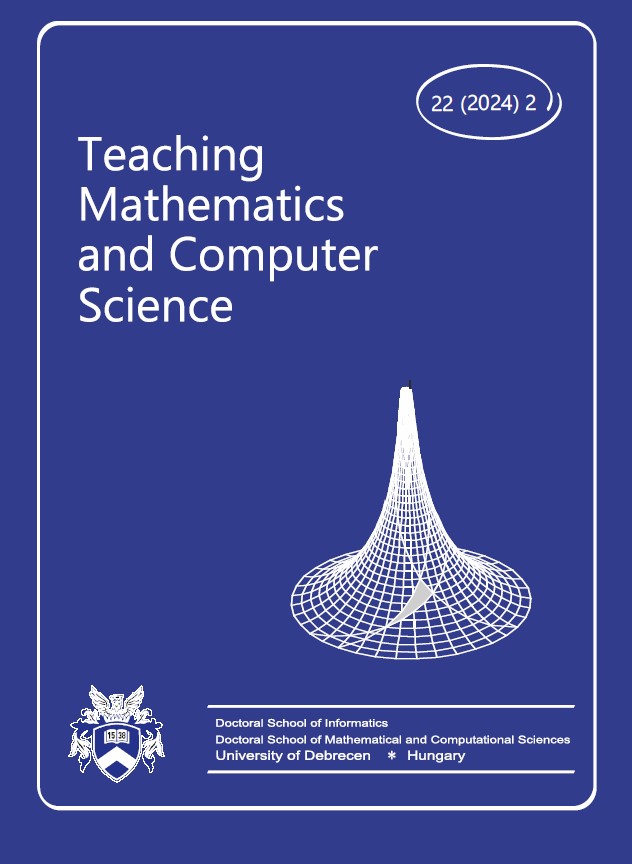Didactical remarks on the changes in the requirements of the matriculation exam in Mathematics in Hungary
Author
View
Keywords
License
Copyright (c) 2024 Evelin Anna Geszler

This work is licensed under a Creative Commons Attribution 4.0 International License.
How To Cite
Abstract
Students within the Hungarian education system typically take a matriculation exam to obtain a secondary education certificate, which also serves as a prerequisite for university admission. Public education is regulated at different levels. One of its most fundamental elements is the National Core Curriculum, the current version of which came into force in September 2020. It is crucial to adapt the requirements of the matriculation exam in mathematics to this and ensure transparent communication about the changes. Regarding this, there exists a sample paper that contains tasks that one can reasonably expect in the actual exam in the spring. Since I have been working as a private math tutor for almost a decade and have been preparing students for the matriculation exam since then, I intend to highlight the most outstanding features from a didactic point of view based on the analysis of this sample paper.
Subject Classification: 97A30, 97B10, 97B70, 97D60, 97U40
References
- Ambrus, G. (n.d.). Valóságközeli feladatok [Realistic tasks]. Lecture Notes. Retrieved 12 March, 2024. https://ttomc.elte.hu/publications/77
- A megértés a tevékenykedtetés során szerzett gazdag tapasztalatokra épüljön – interjú Csapodi Csaba tananyagfejlesztővel [Understanding should be built on rich experiences gained through activities – an interview with Csaba Csapodi, curriculum developer]. Új Köznevelés, 77 (8), 11–13. Retrieved 29 February, 2024. https://real-j.mtak.hu/23527/7/uj_kozneveles_2021_77_8_.pdf
- Csapodi, Cs. (2016). Evaluation of the Hungarian final exams in mathematics in the last 10 years and presenting the changes from 2017. In J. Korándi, & É. Vásárhelyi (Eds.), Proceedings of the Arbeitskreis Ungarn: Beiträge zur Ersten Tagung 02.-03. Oktober 2015 Budapest (pp. 25–34). Haxel Press.
- Csapodi, Cs., & Koncz, L. (2016). The efficiency of written final exam questions in mathematics based on voluntary data reports, 2012–2015. Teaching Mathematics and Computer Science, 14 (1), 63–81.
- Csapodi, Cs., & Filler, A. (2017). How much knowledge students need for the high school final exams in mathematics? A comparison between Hungary and Germany, In J. Korándi, & É. Vásárhelyi (Eds.), Arbeitskreis Ungarn: Beitr¨age zur Tagung 07.-08. Oktober 2016 Budapest (pp. 15–24). Haxel Press.
- Csapodi, Cs., & Hoffmann, M. (2021). Changes in Mathematics Core Curriculum and Matriculation Exam in the Light of the COVID-19-Shock. Education Sciences, 11 (10), 610. doi: 10.3390/educsci11100610
- Gosztonyi, K.(2020). Tamás Varga’s reform movement and the Hungarian Guided Discovery approach. Teaching Mathematics and Computer Science, 18 (3), 11–28. doi: 10.5485/TMCS.2020.0475
- Hungarian Educational Authority. Részletes vizsgakövetelmények és vizsgaleírások [Detailed exam requirements and exam descriptions]. Retrieved 29 February, 2024. https://www.oktatas.hu/pub_bin/dload/kozoktatas/erettsegi/vizsgakovetelmenyek2024/matematika_2024_e.pdf
- Hungarian Educational Authority.Matematika mintafeladatok, középszint [Mathematics Sample Paper at Intermediate Level]. Retrieved 13 March, 2024. https://www.oktatas.hu/kozneveles/erettsegi/mintafeladatok_2024
- Hungarian Educational Authority. Tasks and functions of the Educational Authority. Retrieved 29 February, 2024. https://www.oktatas.hu/projects_educationalauthority
- Lukács, J., & Tompa, K. (2002). The new mathematics matriculation/entrance exam system in Hungary. In Proceedings of the 2nd International Conference on the Teaching of Mathematics (at the Undergraduate Level) (1-6 July, 2002, Hersonissos, Crete).
- National Core Curriculum (2020). Magyar Közlöny [Hungarian Gazette], 2020 (17). Retrieved 13 March, 2024. https://magyarkozlony.hu/dokumentumok/3288b6548a740b9c8daf918a399a0bed1985db0f/megtekintes
- Trgalová, J., Clark-Wilson, A., & Weigand, H. (2018). Technology and resources in mathematics education. In T. Dreyfus, M. Artigue, D. Potari, S. Prediger, & K. Ruthven (Eds.), Developing Research in Mathematics Education: Twenty Years of Communication, Cooperation and Collaboration in Europe (pp. 142–161).
- Vágó, I., & Vass, V. (2007). The content of education. In Z. Loboda, J. Lannert, & G. Halász (Eds.), Report on Public Education in Hungary 2006 (pp. 197–278). National Institute of Public Education.

 https://doi.org/10.5485/TMCS.2024.14071
https://doi.org/10.5485/TMCS.2024.14071






